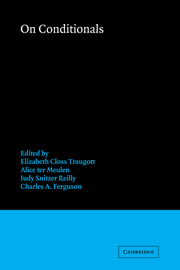3 - CONDITIONALS AND MENTAL MODELS
Published online by Cambridge University Press: 04 August 2010
Summary
INTRODUCTION
What would count as a complete theory of conditionals? One goal for such a theory is to answer the following two questions:
(i) What do conditionals mean?
(ii) What are their logical properties?
These are matters of logical and linguistic analysis: they concern human competence. However, a complete theory of conditionals should also answer two psychological questions:
(iii) How do people understand them?
(iv) How do people reason with them?
These are matters of human performance that call for the investigation of mental processes.
There are a number of theories that provide answers to some of these four questions. Yet, despite the conceptual analyses of philosophers and logicians, the semantic and syntactic studies of linguists, and the experimental investigations of psychologists, there is no single existing theory that provides a unified and complete account of both competence and performance. My aim in this paper is accordingly to make progress towards such a theory – a theory that concerns the everyday interpretation and use of conditionals, not an idealized philosophical concept, and one that is intended as a contribution to cognitive science.
The paper has four parts. The first part considers how ordinary individuals reason with conditionals, and it describes the main approach that psychologists have taken to deductive reasoning – the theory that there are formal rules of inference in the mind. It argues, however, that this view is mistaken and that inference depends instead on a search for ‘mental models’ of premises that are counterexamples to putative conclusions.
- Type
- Chapter
- Information
- On Conditionals , pp. 55 - 76Publisher: Cambridge University PressPrint publication year: 1986
- 18
- Cited by



